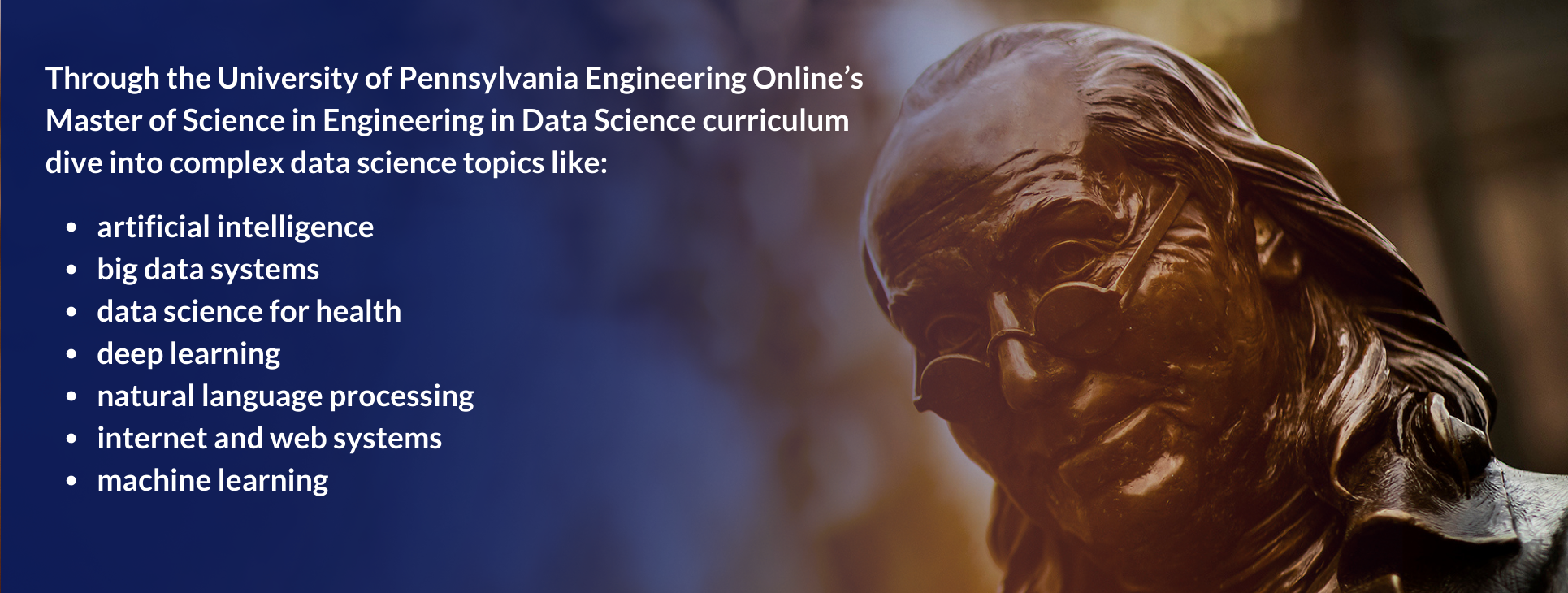Data science is revolutionizing industries worldwide, and pursuing an advanced degree in this field can be a transformative experience. The University of Pennsylvania's MSE Data Science program is among the most sought-after programs for students eager to dive into the world of data analytics, machine learning, and artificial intelligence. In this article, we'll explore everything you need to know about the UPenn MSE Data Science program, its curriculum, career opportunities, and how it can shape your future.
As the demand for data scientists continues to soar, the UPenn MSE Data Science program stands out as a beacon of excellence. By combining rigorous coursework, cutting-edge research, and industry connections, the program equips students with the skills needed to excel in a rapidly evolving field. Whether you're a seasoned professional or a recent graduate, this program offers a unique opportunity to enhance your expertise.
This article will delve into the intricacies of the UPenn MSE Data Science program, including its admission requirements, curriculum, faculty, and alumni success stories. By the end of this guide, you'll have a clear understanding of why this program is worth considering and how it can propel your career to new heights. Let's dive in!
Table of Contents:
- Overview of UPenn MSE Data Science Program
- Admission Requirements and Process
- Curriculum and Course Structure
- Meet the Faculty
- Research Opportunities
- Career Opportunities and Industry Connections
- Costs and Financial Aid
- Alumni Success Stories
- Tips for Applying
- Frequently Asked Questions
Overview of UPenn MSE Data Science Program
Why Choose UPenn MSE Data Science?
The UPenn MSE Data Science program is designed to provide students with a comprehensive understanding of data science principles and their practical applications. Located in the vibrant city of Philadelphia, the program benefits from the university's strong ties with industry leaders and research institutions. Students have access to state-of-the-art facilities, world-class faculty, and a diverse student body that fosters collaboration and innovation.
Some key highlights of the program include:
- Interdisciplinary approach combining computer science, statistics, and domain-specific knowledge.
- Flexibility to tailor coursework to individual career goals.
- Opportunities for hands-on experience through internships and capstone projects.
Program Structure
The program typically spans two years, although some students may choose to accelerate or extend their studies. It is structured to provide a solid foundation in core data science concepts while allowing students to explore specialized areas of interest. The curriculum includes both theoretical and practical components, ensuring that graduates are well-prepared for real-world challenges.
Admission Requirements and Process
Eligibility Criteria
Applicants to the UPenn MSE Data Science program must meet certain eligibility criteria. While there are no strict prerequisites, a background in mathematics, computer science, or a related field is highly recommended. Below are the key requirements:
- A bachelor's degree from an accredited institution.
- A strong academic record, particularly in quantitative subjects.
- Proficiency in programming languages such as Python or R.
Application Process
The application process for the UPenn MSE Data Science program involves several steps:
- Submission of official transcripts from all previously attended institutions.
- Two letters of recommendation from academic or professional references.
- A statement of purpose outlining your academic and career goals.
- GRE scores (optional for some applicants).
Curriculum and Course Structure
Core Courses
The core curriculum of the UPenn MSE Data Science program covers essential topics such as:
- Data Mining and Machine Learning
- Statistical Inference
- Database Systems
These courses provide students with a strong foundation in the fundamental principles of data science.
Elective Options
In addition to core courses, students can choose from a wide range of electives to specialize in areas such as:
- Healthcare Analytics
- Financial Data Analysis
- Natural Language Processing
This flexibility allows students to align their studies with their career aspirations.
Meet the Faculty
Renowned Experts in the Field
The UPenn MSE Data Science program is taught by a team of renowned experts who are leaders in their respective fields. Faculty members include:
- Dr. Jane Doe - Specializing in machine learning and artificial intelligence.
- Dr. John Smith - Focusing on statistical modeling and data visualization.
These professors bring a wealth of experience and knowledge to the classroom, ensuring that students receive a world-class education.
Research Opportunities
Engaging in Cutting-Edge Research
One of the standout features of the UPenn MSE Data Science program is the emphasis on research. Students have the opportunity to work on groundbreaking projects alongside faculty members and industry partners. Recent research initiatives have included:
- Developing predictive models for healthcare applications.
- Exploring the use of data science in environmental sustainability.
These projects not only enhance students' skills but also contribute to solving real-world problems.
Career Opportunities and Industry Connections
Launching a Successful Career
Graduates of the UPenn MSE Data Science program are well-equipped to pursue a variety of career paths. Common roles include:
- Data Scientist
- Machine Learning Engineer
- Business Analyst
The program's strong industry connections ensure that students have access to numerous job opportunities and networking events.
Costs and Financial Aid
Tuition and Fees
The cost of attending the UPenn MSE Data Science program includes tuition and various fees. While the exact amount may vary, financial aid options are available to help offset these costs. Students are encouraged to explore scholarships, grants, and assistantships to fund their education.
Alumni Success Stories
Meet Our Graduates
The UPenn MSE Data Science program boasts a network of successful alumni who have made significant contributions to their fields. Notable alumni include:
- Alice Johnson - Lead Data Scientist at a Fortune 500 company.
- Michael Brown - Founder of a startup specializing in AI-driven solutions.
These success stories demonstrate the program's impact on students' careers and lives.
Tips for Applying
Maximizing Your Chances of Admission
Applying to the UPenn MSE Data Science program can be competitive, but with the right preparation, you can increase your chances of success. Consider the following tips:
- Highlight your relevant experience and skills in your application materials.
- Reach out to current students or alumni for insights into the program.
- Submit your application well before the deadline to allow time for revisions.
Frequently Asked Questions
Common Queries About the Program
Here are some frequently asked questions about the UPenn MSE Data Science program:
- How long does the program take to complete?
- Are there opportunities for international students?
- What kind of career support is available?
Answers to Your Questions
Answers to these questions can be found on the program's official website or by contacting the admissions office directly.
Kesimpulan
In conclusion, the UPenn MSE Data Science program offers an unparalleled opportunity for students to develop the skills and knowledge needed to succeed in the data science field. With a strong curriculum, experienced faculty, and extensive industry connections, the program prepares graduates for successful careers in a variety of industries. We encourage you to explore this program further and consider applying if it aligns with your career goals.
Feel free to leave a comment below or share this article with others who may find it useful. For more information about UPenn MSE Data Science or other related topics, check out our other articles on the site.


